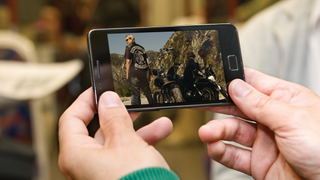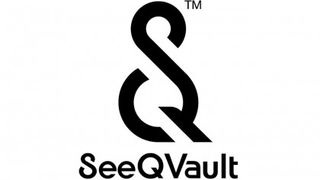Meet SeeQVault: the new tech that will change the way you watch TV
Making shaky streaming a thing of the past

SeeQVault could be the next big thing in personal entertainment. It could change the way you watch TV, and it's coming your way very soon.
In short it's new technology standard that will allow you to save your TV recordings from your set-top box to your smartphone or tablet.
The new tie-up between Panasonic, Sony, Samsung and Toshiba (or PSST Company, for short) is called SeeQVault, and will be restricted to flash memory devices (Apple products won't be included).
Sony's Victor Matsuda (Chief Communications Officer for Next-Generation Secure Memory Initiatives, the joint company formed by PSST) says that SeeQVault has a very simple goal: "We're just trying to help consumers to enjoy content in HD forms and beyond on their mobile devices.

What is SeeQVault?
"It's a security and content management technology for any kind of flash memory product, be it SD, USB, HDD or even embedded memory," says Matsuda. "It handles hi-def, and 4k is on our roadmap."
The use-case scenario goes something like this: record a TV programme to your PVR, copy it to an SD Card, microSDHC Card or USB stick, then watch that content on a smartphone when you're on the way to work the next day.
"We're especially targeting those kind of applications for mobile and home devices," says Matsuda. "We've seen an explosion in the last three or four years in the mobile sector, so that's our priority." Mobile-based products made up over 50% of the global market for consumer electronics for the first time last year.
Get daily insight, inspiration and deals in your inbox
Get the hottest deals available in your inbox plus news, reviews, opinion, analysis and more from the TechRadar team.
Ostensibly a new encryption technique that can cope with mobile devices, SeeQVault has its own proprietary file format, though it's possible to use it on ubiquitous video file formats like .mpeg4 and .avi. Nor is SeeQVault restricted to video or music - it works with any data.
Why do we need it?
Have you ever recorded something on your TiVo or Sky+HD box, then downloaded it separately over Wi-Fi from the BBC iPlayer to your phone to watch on the commute? SeeQVault gets rid of duplication and side-steps data caps, but it also prevents broadband speeds and bandwidth from getting in the way of mobile video.
With the arrival of 4k, that's crucial. SeeQVault could also be useful if you've got an 8GB phone: a 4k movie downloaded over 3G or Wi-Fi would take hours, and fill up your phone.
"A data plan will be subject to heavy usage, especially with 4k files," says Matsuda. "The Wi-Fi option is sometimes the best option, but SeeQVault is much more stable – and 4k is coming very quickly." The industry also needs a next-gen digital rights management scheme that plays nicely with mobile devices while preventing piracy.

Will SeeQVault work with existing devices?
The October launch of SeeQVault will see the release of a bevy of natively compatible products, but a SeeQVault adaptor will enable any HDD to use the tech to playback SeeQVault-protected content PCs, TVs and set-top devices with integrated HDDs.
Are there any SeeQVault devices yet?
Actually there are three: two 16GB and 32GB microSDHC memory cards from Toshiba, and the Sony WG-C20 portable wireless server (designed to use with Sony Xperia phones in Japan), which has a SeeQVault-compliant SD Card slot.
"There are plans for a much grander launch in Japan," says Dean Short, Corporate Counsel and Business Development at Toshiba America Information Systems, and spokesperson for NSM.
All are sold only in stores in Japan, where mass-market devices will be launched by the end of this year. A rollout-to the US and Europe is planned for 2015. He also tells us that the aim is to get SeeQVault compatibility into TVs, Blu-ray recorders, smartphones and tablets: "it's form factor-agnostic, as long as it's flash memory."
Why is Japan getting SeeQVault first?
Largely because of the popularity of Blu-ray recorders, which haven't caught on nearly as much in Europe or the US. "Japan has been the focus so far because it's the low-hanging fruit," says Short. "Japanese consumers are very focused on recording digital broadcasts over the air and cataloguing that by burning to Blu-ray discs, so there's an obvious fit to build devices to take those recordings on the go and to plug and play them on devices with an SD Card slot."
Jamie is a freelance tech, travel and space journalist based in the UK. He’s been writing regularly for Techradar since it was launched in 2008 and also writes regularly for Forbes, The Telegraph, the South China Morning Post, Sky & Telescope and the Sky At Night magazine as well as other Future titles T3, Digital Camera World, All About Space and Space.com. He also edits two of his own websites, TravGear.com and WhenIsTheNextEclipse.com that reflect his obsession with travel gear and solar eclipse travel. He is the author of A Stargazing Program For Beginners (Springer, 2015),
Most Popular

